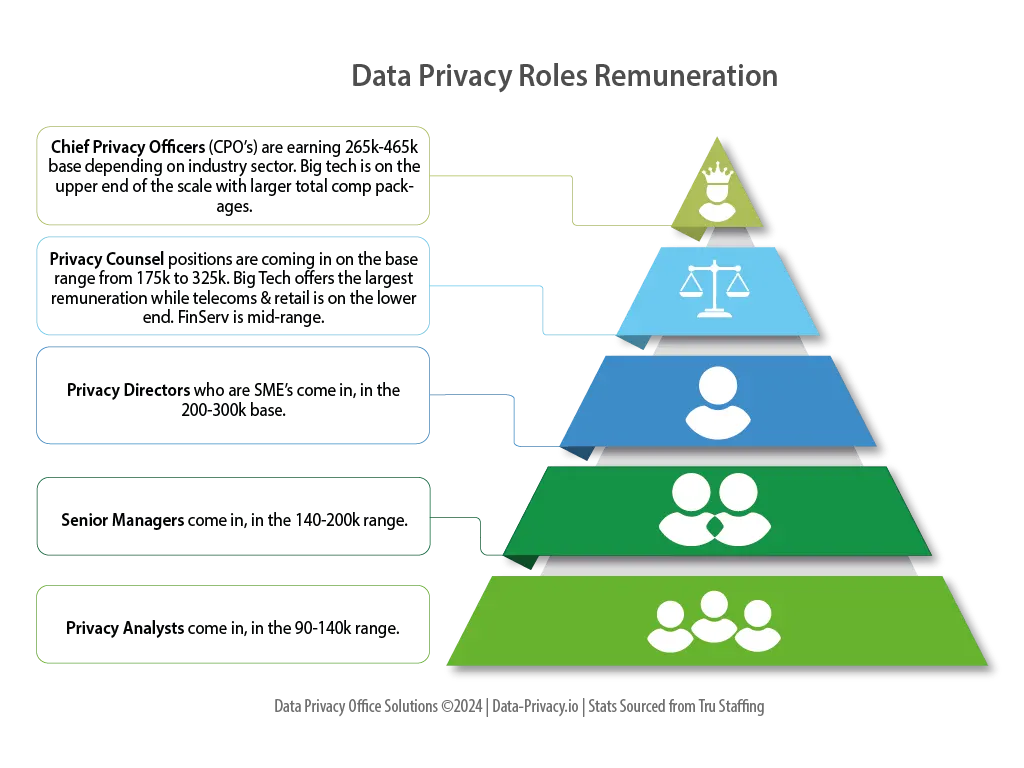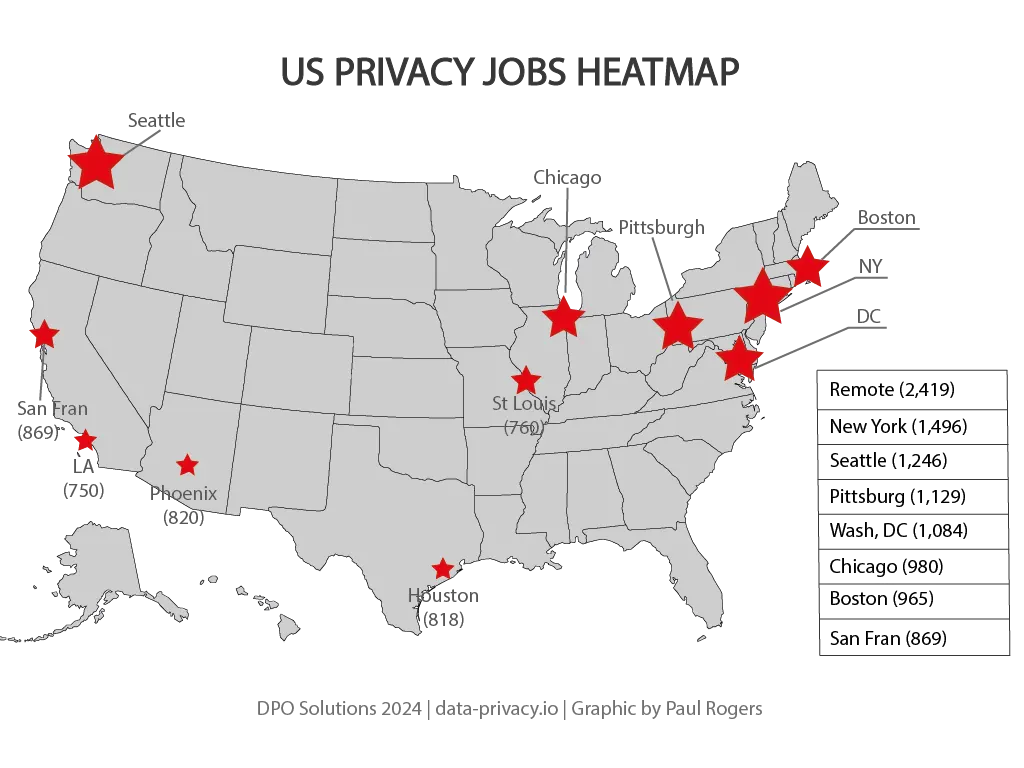
Despite this years mass layoffs in 2023, the data privacy jobs business is booming, more states are introducing privacy regulations in the US while a 14% increase in breaches and more regulatory sanctions have led to more demand for professionals and increased salaries. Richard Wahlquist, chief executive at the American Staffing Association, a trade group that represents staffing companies across industries says that “Tech is everywhere in the labor market, and that the relatively small number of layoffs at some very prominent large companies is not going to change that”.
The main privacy membership and certification organization The IAPP boasts over 75,000 members (up from 50,000 in 3 years) while TRU staffing partners latest data privacy jobs report shows a 30% year on year increase in demand for privacy pros with many candidates being placed in a week and receiving 3 job offers on average.
From a salary perspective, things look very healthy indeed. Entry level positions such as data privacy analyst are commanding an unprecedented $75 to $95 thousand dollars while senior privacy consultant positions come in the $175k to $250k range. The upper end of the scale being offered by Big Tech organizations.The CEO of TRU staffing ‘Jared Coseglia’ says “Data Privacy is now one of the fastest-growing and highest-paid professional ecosystems in the world” and by all the available data that seems to be the case.
What’s Driving the Growth in Data Privacy Jobs?
Multiple sources now attribute the growth to organizations who are now placing a premium on the reputational dividend associated with being privacy mature. They see the benefits of being seen to care about customer data in a world where perception is reality.
There’s also the matter of the complexity of the data privacy regulatory landscape with new rules coming on stream like the federal american data privacy protection act (ADPPA), The Transatlantic Data Privacy Framework (TADPF), CPRA (California Privacy Rights Act), multiple state stautes (currently 11 states up from 5 last year) and european laws like the ePR (Cookie Law). And of course not forgettng the AI regulatory horizon where the EU has proposed a new AI regulatory framework which is already leading to new AI privacy / compliance roles on job boards in advance of stringent governance requirements.
Traditionally the security function took up the mantle for privacy and security needs, but privacy roles like chief privacy officer, DPO and privacy consultant have become apparent. Consumer consent needs to be tracked, processing activities need to be monitored, complaints need to be handled and privacy ecosystems needs help to be automated by people.
In short, the big tech guns have embraced privacy and hired accordingly so now it’s the turn of the client companies to do the same.
What about the impact of AI in privacy jobs?
AI is disrupting staffing across the tech sector as businesses shift to generative AI tools like chatbots and AI powered data analysis tools. This is translating into more job specs with skill requirements for Data & AI compliance / privacy specialists. A recent example spec from a Big 4 firm shows requirements for someone who can
- Demonstrate a command of data governance and artificial intelligence, and related policy, laws and regulations;
- Has worked supporting a compliance program, ideally at multinational organization and/or in the digital, AI or technology space;
- Proven ability to operationalize and implement strategy and policies
- Demonstrate ability to identify, understand and assess trends and developments in data governance and AI, such as the proposed EU AI and digital packages, and to explain issues in a practical, results-focused manner
- Ability to synthesize complex analysis into clear and consistent recommendations.
More an more roles with privacy + AI requirements are coming online on job boards across the gamut particularly from big tech firms like Amazon.
Where are the most privacy jobs in the US?
A quick scan through the job postings (Dec ’23) on Indeed in the US leads the way to the employment hot-spots for privacy jobs. New York, Seattle and Pittsburg are in the top 3 spots followed by DC, Chicago and Boston. Interestingly the highest category of jobs comes under the remote jobs category (2,419) which will suit many applicant and is reflective of the post-Covid flexibility in the market today.
It’s worth noting that results change from month to month as Atlanta dropped out of the top 10 from the last time I ran this report 4 months ago.
How do I prepare for a data privacy role?
Certification and experience goes a long way. The CIPP and CIPM certifications are sought after by any employer as a way to get to the first interview at least. See our related articles on Best privacy and security certifications in 2024 and Qualities of a good Data Privacy Officer which may help clarify formal aspects of qualifying for privacy roles. If your looking to get a crash introduction to data privacy awareness training, checkout our data privacy awareness training ppt or request a 1/2 hour session to discuss your privacy training objectives by emailing [email protected]
In truth, data privacy specializations are becoming more common in the field which are linked to particular vendors which means speciality certifications and specific hands on experience will be required. This is quite common with privacy enhancing technologies and unified privacy management dashboard solutions like OneTrust’s. It’s also true of emerging technologies such as AI where regulatory compliance is now an issue. Newer job roles such as AI privacy & AI compliance analyst are starting to appear on job boards in the US & EMEA regions. This reflects that way technology is evolving and driving the job market
It’s also important to familiarize yourself with some of the most common privacy questions as well. Interview Prep provides a nice list here of 20 questions for DPO type roles but they can be used for other types of roles. Questions like, Describe a time when you had to investigate a potential breach of personal information? and, what strategies do you use to identify and address gaps in existing privacy policies? along with 18 others are very helpful.
As a practitioner in the field, it’s important to follow data protection authorities and setup Google Alerts for keywords for regulatory changes. Have a look at our ‘Privacy and Security Links to follow in 2024‘ page for ideas on links to follow.
Have your say! what do you think will happen in the privacy job market in 2024. Leave your comment in the comment section at the bottom of this page.
|



